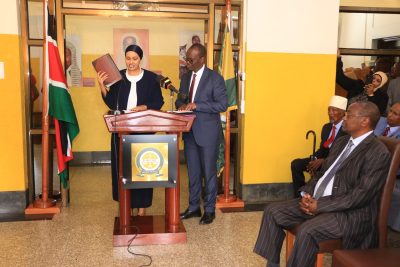The National Land Commission (NLC) plays a pivotal role in the management and governance of land in Kenya. Established under Article 67 (1) and Chapter 15 of the Constitution of Kenya, 2010, the NLC is a constitutional commission with a clear mandate to oversee matters relating to land and ensure the equitable and sustainable use of this crucial resource. This article delves into the functions of the National Land Commission and its impact on land governance in Kenya.
Establishment and Structure of the National Land Commission
The NLC was operationalized by three key laws:
- The National Land Commission Act, 2012
- The Land Act, 2012
- The Land Registration Act, 2012
The Commission consists of a Chairman and eight commissioners, all appointed for a non-renewable six-year term. The inaugural commissioners were gazetted on February 20, 2013, and started their term on February 23, 2013. The second set of commissioners took office on November 15, 2019. Under their leadership, the Commission has made significant strides, including the development of the Strategic Plan 2021-2026, which serves as a roadmap for the implementation of NLC’s mandate. Additionally, the NLC has partnered with various development stakeholders to enhance its program execution.
Core Functions of the National Land Commission
The Constitution of Kenya outlines the functions of the National Land Commission under Article 67 (2). These functions have further been elaborated by the National Land Commission Act and other related statutes. Below are the key functions of the Commission:
1. Managing Public Land on Behalf of National and County Governments
One of the primary responsibilities of the NLC is to oversee the management and administration of public land in Kenya. This involves ensuring that public land is allocated, utilized, and managed in accordance with the law. The Commission also ensures that public land is used in a manner that promotes sustainable development and protects natural resources.
2. Recommending National Land Policy
The NLC is responsible for providing recommendations to the national government on land policy. This includes advising on legal reforms, land use planning, and the regulation of land ownership to address issues such as landlessness, land tenure, and equitable access to land.
3. Advising on Land Registration
The Commission is tasked with advising the national government on a comprehensive program for the registration of titles in land across the country. This ensures that land ownership is properly documented, reducing disputes and encouraging investment in land.
4. Conducting Research on Land and Natural Resources
The NLC conducts research on matters related to land and natural resource management. This research helps inform policy decisions and provides insights into sustainable land use practices. The Commission’s findings are shared with relevant authorities to facilitate informed decision-making on land governance.
5. Investigating Historical and Current Land Injustices
A unique and crucial function of the NLC is to investigate both current and historical land injustices. The Commission can initiate investigations on its own or act on complaints from the public. After thorough investigations, the NLC recommends appropriate remedies to rectify land injustices and bring closure to longstanding grievances.
6. Encouraging the Use of Traditional Dispute Resolution Mechanisms
Land disputes are common in Kenya, and the NLC promotes the use of traditional dispute resolution mechanisms as an alternative to litigation. This approach helps resolve conflicts amicably and in a manner that is culturally relevant and accessible to local communities.
7. Assessing Land Taxes and Premiums on Immovable Property
The NLC has the authority to assess taxes on land and premiums on immovable property in areas designated by law. This function is essential for generating revenue and ensuring the effective use of land.
8. Oversight of Land Use Planning
The Commission monitors and exercises oversight responsibilities over land use planning across the country. This involves ensuring that land is used in a sustainable manner and that developments are consistent with environmental protection and national development goals.
Other Statutory Functions
In addition to the core functions outlined in the Constitution, the National Land Commission is also guided by other laws such as the National Land Commission Act (2012) and the Land Act (2012). These statutes empower the NLC to:
- Initiate land allocation: Ensure equitable allocation of public land.
- Develop and maintain a public land inventory: Create a detailed inventory of all public land in Kenya.
- Manage land-related information systems: Establish and maintain a system to collect, store, and manage information on land ownership and use.
- Oversee land administration systems: Ensure effective land administration practices that promote transparency and accountability.
Recent Achievements of the National Land Commission
The second group of commissioners has been instrumental in the progress made by the NLC since taking office in 2019. Some of their notable achievements include:
- Strategic Plan 2021-2026: This plan outlines the Commission’s goals and objectives for the next five years, with a focus on improving land governance and promoting equitable access to land.
- Partnerships: The Commission has partnered with various international and local development organizations to enhance the implementation of its programs and strengthen its capacity.
Challenges Facing the National Land Commission
Despite its successes, the NLC faces several challenges, including:
- Land corruption: Corruption in land allocation and registration remains a significant issue, undermining the Commission’s efforts.
- Land disputes: Kenya has a long history of land disputes, many of which are deeply rooted in colonial-era injustices. Resolving these conflicts is a complex and ongoing task.
- Resource constraints: The NLC often faces budgetary limitations that hinder its ability to execute its mandate effectively.
National Land Commission Contacts
For more information or inquiries, you can contact the National Land Commission at the following address:
- Location: 316 Upper Hill Chambers, 2nd Ngong Avenue, Off Ngong Road, Nairobi
- Contact: 0111 042 800
The National Land Commission plays a vital role in land governance in Kenya. Its functions, which include managing public land, advising on land policy, investigating land injustices, and promoting sustainable land use, are crucial for ensuring that land resources are managed equitably and sustainably. However, the NLC faces significant challenges, including land corruption and resource constraints, which it must overcome to fully realize its mandate. By understanding the Commission’s functions and staying informed about its activities, Kenyans can engage more effectively in land-related matters and ensure that their rights are protected.





